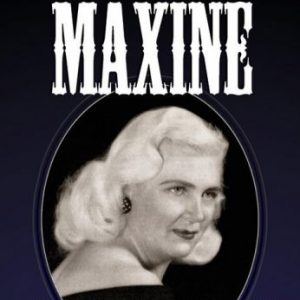calsfoundation@cals.org
Maxine Temple Jones (1915–1997)
Maxine Temple Jones was a Hot Springs (Garland County) businesswoman during the period from 1945 to the early 1970s. A well-known madam with numerous political connections, she managed a lucrative brothel operation that catered to politicians, businessmen, and mobsters. She documented her life in an autobiography published in 1983 titled Maxine “Call Me Madam”: The Life and Times of a Hot Springs Madam.
Dora Maxine Temple was born on June 15, 1915, in Johnsville (Bradley County) to David F. Temple and Maude Orr Temple. She had five brothers and one sister. Her father was a farmer and logging contractor. When referring to her early youth, Temple described herself as a “tomboy” who preferred spending time with her father in the fields, dressing in overalls, and learning how to shoot a rifle and hunt. However, by the time she turned fifteen, she had developed a taste for “fancy, beautiful things” and had begun to yearn for independence.
Upon graduation from high school, Temple moved to Paris, Texas. It was there, while working in a department store, that a co-worker introduced her to prostitution as a way to expand her meager earnings. During this period, Temple became acquainted with Nell Raborn, madam of a large brothel in Texarkana, Texas. The two women developed an immediate rapport, with Temple eventually relocating to Texarkana to work for Raborn.
During her association with Raborn’s business, Temple showed an aptitude for managing all aspects of the operation and gained a reputation for strong nerves and solid business sense. However, after the United States’ entry into World War II, the government closed the red-light district of Texarkana. Caught up in the fever of war and patriotism, Temple quickly married a young soldier named Eugene Harris, who was soon sent overseas. In 1943, Temple decided to join the Women’s Army Auxiliary Corps, hoping to be sent overseas as well. Instead, she was stationed for two years at Andrews Air Force Base in Washington DC. When her enlistment period ended, she returned to Arkansas, where she was employed as a security guard at the Camden (Ouachita County) arsenal. After the war ended, she eventually returned to her former employment at Raborn’s. When her husband returned, she confessed that she was a “rackets” woman and had no desire for marriage or children. Although he hoped that she would change her mind, the couple eventually divorced.
Temple continued working at Raborn’s until 1948, when a short visit to Hot Springs changed the direction of her life once again. Attracted to the city, she quickly found a job in a local house of prostitution on Prospect Street. By 1950, she had amassed enough money to buy out the proprietress and establish the business as her own.
According to her autobiography, Temple established political connections in Hot Springs that would best serve her interests, thus allowing her operation to flourish. She was able to expand her business, most notably with the purchase of a large home on Palm Street, which became known as “The Mansion.” She entertained her “high-classed” clientele, including local businessmen, doctors, top state officials, congressmen, and prominent mobsters who were expanding an illegal gambling empire in the city. However, Temple soon clashed with the mob over its attempts to control her operation. She married Worth Gregory, a drug addict with a criminal background, who drained her finances and forced her to defend herself against narcotics charges (for which she was acquitted). As a result, she was eventually forced out of business, with Gregory returning to prison, where he died in 1963.
Temple reestablished her operations and was soon back in business, but she continued to be harassed by the mob and a coalition of law enforcement agents under its influence. In 1963, she was arrested and sentenced to two years in Cummins Prison, which housed female prisoners from 1951 to 1976.
After her release in 1965, Temple returned to Hot Springs. (She later received a full pardon from Governor Winthrop Rockefeller after disclosing information concerning illegal gambling operations in Hot Springs). With a loan from a friend, she purchased the Central Avenue Hotel and began operations. Feeling that she needed protection, she partnered with Edward Jones, a career criminal whom she married in 1968. Jones’s criminal lifestyle proved an emotional and financial drain. Shortly after Jones’s death in 1971, she closed her remaining businesses and relocated to Little Rock (Pulaski County) for a few years before retiring in Hot Springs.
Seeking “peace of mind” and to “set the record straight” concerning corruption and politics in Hot Springs, she published her autobiography, under the name Maxine Jones, in 1983, documenting her life as well as the political system she encountered as a businesswoman in Hot Springs.
Jones died at Wagnon Place Nursing Home in Warren (Bradley County) on April 15, 1997, and is buried in Palestine Cemetery. One of her former business locations, the Central Avenue Hotel, was renovated in 1989 and reopened in 1991 as Maxine’s Coffee House and Puzzle Bar.
For additional information:
Jones, Maxine. Maxine “Call Me Madam”: The Life and Times of a Hot Springs Madam. Hot Springs, AR: Hot Air Publishing, 2008.
Obituary of Dora Maxine Temple Jones. Arkansas Democrat-Gazette. April 17, 1997, p. 4B.
Toney Butler Schlesinger
Granite Bay, California








Comments
No comments on this entry yet.